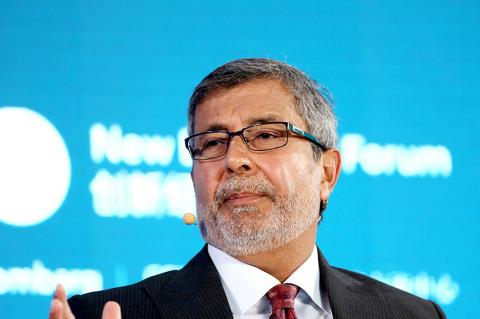Micron Technology Inc gave a strong sales forecast for the current quarter and told investors it is through the worst of a slump in the memorychip industry.
It expects revenue of as much as US$4.8 billion in the fiscal second quarter, Micron said in a statement. Analysts had projected US$4.76 billion, according to data compiled by Bloomberg.
Adjusted earnings would be will be US$0.35 a share, plus or minus US$0.06. Analysts estimated US$0.40 a share on average.

Photo: Bloomberg
“We are optimistic that Micron’s fiscal second quarter will be the cyclical bottom for our financial performance,” Micron chief executive officer Sanjay Mehrotra said in the statement.
Shares of the Boise, Idaho-based company rose about 3 percent in extended trading following the report. They closed at US$53.04 earlier on Wednesday, leaving them up 67 percent this year. The shares have rallied more than 10 percent this month.
Net income in the fiscal first quarter, which ended on Nov. 28, fell to US$491 million, or US$0.43 a share, from US$3.29 billion, or US$2.81 a share, a year earlier. Revenue declined 35 percent to US$5.14 billion.
The company makes DRAM and NAND flash memory chips.
Under Mehrotra, Micron has pursued different markets for its chips to reduce wild swings in the balance of supply and demand. The company has so far been able to avoid the heavy losses it experienced as recently as 2016.
At its lowest ebb in that year, the company burned through US$1.3 billion in cash in a quarter, Mehrotra said. If his projections for fiscal 2020 pan out, it would be the fourth year in a row the company has had positive free cash flow, the first time it has managed such a run.
“Of course, there will be cycles such as what we experienced in 2019,” he said in an interview. “But even in the most challenging environment, Micron has delivered relatively strong results.”
The US government’s designation of Huawei Technologies Co (華為) as a threat to national security has dented sales of Micron, which has been a major supplier to the Chinese company.
Micron applied for a license to resume shipments, arguing, like many of its US peers, that the ban hurts US chipmakers because Huawei can get the same components from foreign rivals.
Micron on Wednesday confirmed that it “received all of the requested licenses that enable us to provide support for certain products” to Huawei for the Chinese firm’s mobile and server businesses.
Resuming that relationship would take time and Micron does not anticipate “a material impact on our revenue for the next couple of quarters,” the company said in the statement.
Micron’s biggest competitors are South Korea’s Samsung Electronics Co and SK Hynix Inc, which are not subject to US export restrictions.

To many, Tatu City on the outskirts of Nairobi looks like a success. The first city entirely built by a private company to be operational in east Africa, with about 25,000 people living and working there, it accounts for about two-thirds of all foreign investment in Kenya. Its low-tax status has attracted more than 100 businesses including Heineken, coffee brand Dormans, and the biggest call-center and cold-chain transport firms in the region. However, to some local politicians, Tatu City has looked more like a target for extortion. A parade of governors have demanded land worth millions of dollars in exchange

An Indonesian animated movie is smashing regional box office records and could be set for wider success as it prepares to open beyond the Southeast Asian archipelago’s silver screens. Jumbo — a film based on the adventures of main character, Don, a large orphaned Indonesian boy facing bullying at school — last month became the highest-grossing Southeast Asian animated film, raking in more than US$8 million. Released at the end of March to coincide with the Eid holidays after the Islamic fasting month of Ramadan, the movie has hit 8 million ticket sales, the third-highest in Indonesian cinema history, Film

Taiwan Semiconductor Manufacturing Co’s (TSMC, 台積電) revenue jumped 48 percent last month, underscoring how electronics firms scrambled to acquire essential components before global tariffs took effect. The main chipmaker for Apple Inc and Nvidia Corp reported monthly sales of NT$349.6 billion (US$11.6 billion). That compares with the average analysts’ estimate for a 38 percent rise in second-quarter revenue. US President Donald Trump’s trade war is prompting economists to retool GDP forecasts worldwide, casting doubt over the outlook for everything from iPhone demand to computing and datacenter construction. However, TSMC — a barometer for global tech spending given its central role in the

Alchip Technologies Ltd (世芯), an application-specific integrated circuit (ASIC) designer specializing in server chips, expects revenue to decline this year due to sagging demand for 5-nanometer artificial intelligence (AI) chips from a North America-based major customer, a company executive said yesterday. That would be the first contraction in revenue for Alchip as it has been enjoying strong revenue growth over the past few years, benefiting from cloud-service providers’ moves to reduce dependence on Nvidia Corp’s expensive AI chips by building their own AI accelerator by outsourcing chip design. The 5-nanometer chip was supposed to be a new growth engine as the lifecycle